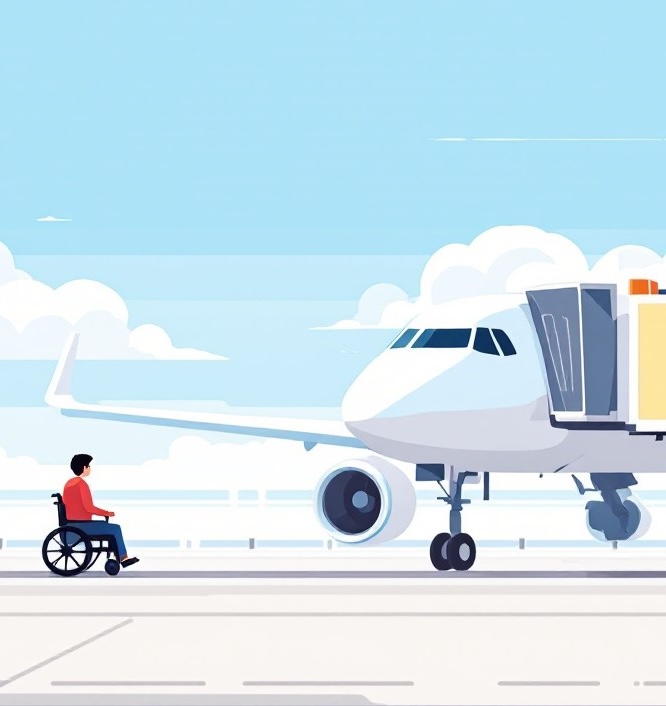At Access-Air-Bility, we’re dedicated to bringing new voices and perspectives into the conversation around accessibility and inclusion in air travel. To explore the principles that shape inclusive practice more broadly, we spoke with Professor Chandrika Devarakonda of the University of Chester. Her work in early childhood, diversity, and inclusive education offers lessons that reach far beyond the classroom.
In this interview, Professor Chandrika reflects on the origins of her research focus, the evolution of inclusive practice, and what other sectors, including aviation, can take from education when designing for everyone.
Interview
Q: Your research has focused heavily on early childhood and education. What first inspired your interest in this area?
A: I strongly believe early childhood is an important stage. My foundations in education at the undergraduate and postgraduate levels enabled me to understand the importance of early childhood. First-hand experiences with young children and their families from disadvantaged areas in the community, and working alongside professionals, enabled me to relate to a wide range of issues impacting young children.
Q: Your recently updated book, Diversity and Inclusion in Early Childhood, blends academic theory with everyday practice and offers a broad, inclusive lens that goes well beyond special educational needs. How have your personal or professional experiences shaped the themes you chose to highlight in the book?
A: I was influenced by evolving literature around the concept of inclusion that originally related to children with special educational needs and disabilities. Further, my perspectives were shaped by discussions with colleagues and fellow academics and students, which led me to extend my perception of inclusion to see an individual from a holistic perspective.
During the revalidation of the Early Childhood Studies programme, one of the modules was changed to a new module called Every Child Special, which embedded different themes including gender, race, culture, disability, Special educational needs, and English as an additional language. This module was popular with the students, but they wished they could have one book that could be used to support them with their module assessment. So, I have proposed a book with chapters on the different themes to Sage, which was acknowledged as a big gap in the market.
Q: At Access-Air-Bility, we’re committed to making air travel more inclusive and accessible. From your perspective as a specialist in inclusive practice, what do you see as the most significant barriers preventing truly inclusive travel experiences today?
A: Every individual has a right to access all types of travel with comfort and respect. However, the facilities provided are based on a one-size-fits-all approach. Significant barriers experienced include attitudes, stereotypes, lack of empathy, poor understanding and lack of awareness of the different needs of individuals, as well as financial limitations. These barriers will also impact airlines that choose not to prioritise the inclusive travel experiences, as customers may choose not to fly with them.
Q: Are there lessons from inclusive education that you think the aviation industry could learn from? What principles do you believe are most important when creating inclusive environments in any sector, including travel?
A: The principles of inclusion will be relevant to all other sectors in any local and global communities. Some lessons from inclusive education that remain important when creating an inclusive environment include meeting individual needs, celebrating and valuing diversity, acknowledging differences as diversity is not uniform and empowering everyone through active listening.
Q: Is there one message or piece of advice you’d like to leave our readers with when it comes to championing inclusion in their everyday lives or professions?
A: Every individual deserves to be respected, individual needs to be acknowledged and met consistently, irrespective of who they are, what they do and where they live. Inclusion must be constant for everyone.
Closing Thoughts
Professor Chandrika’s words are a reminder that inclusion is not just a policy or a checklist. It’s an ongoing commitment to listening, valuing diversity, and adapting systems so that no one is left behind. The same principles that shape inclusive classrooms can, and should, inform how we design inclusive journeys.
At Access-Air-Bility, we believe voices like Professor Chandrika Devarakonda are essential in helping the aviation industry move beyond one-size-fits-all approaches and towards travel experiences that reflect the dignity and diversity of every passenger.
Join Our Advisory Panel!
Want to help shape the future of inclusive air travel? We’re building our advisory panel and would love your insight. Whether you’re an airport staff member, a passenger with lived experience, or a policymaker, your voice matters. Join the Access-air-bility Advisory Panel today.
You can also complete our quick feedback form or share your detailed thoughts via our full experience survey. Prefer a conversation? Get in touch through our contact form and we can arrange to speak with you at a convenient time. Let’s work together to create accessible, empowering air travel for all.


